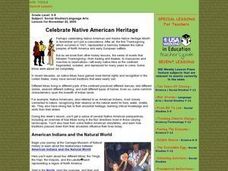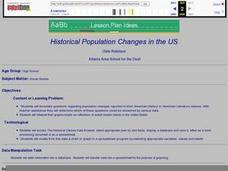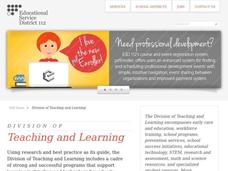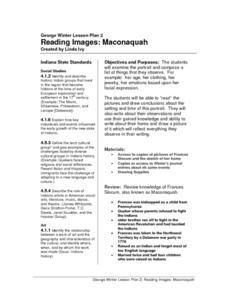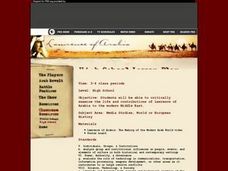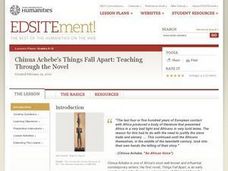Curated OER
Celebrate Native American Heritage
Students examine Native American heritage. They explore a museum of Native American culture and explore their food, dress, and customs. They also explore the Native Americans role in the first Thanksgiving.
Curated OER
World War I
Using maps, diagrams, and lists, this resource is a wonderful way to review the main concepts involving WWI. There are charts with a comparison of imperialism and nationalism, and other key ideas that explain how Europe plunged into this...
Constitutional Rights Foundation
The Cold War: How Did It Start? How Did It End?
What is the difference between a Cold War and a Hot War? Scholars research the beginning of the Cold War. They analyze diary entries as well as excerpts from various events during the 45-year standoff. To finish, they prepare final...
Curated OER
Jeffersonianism at the Bar
Eleventh graders participate in a political roundtable discussion. In this Jeffersonianism lesson, 11th graders role play individuals from the 19th century and discuss issues of the Federalist period.
Alabama Department of Archives and History
Camp Aliceville: The Story of WWII Prisoners of War Who Came to Alabama
POW camps in the United states? In Alabama? The German POW camp in Aliceville, Alabama is used as the focus of a study of the more than 700 camps built in the US during World War II.
Curated OER
Historical Population Changes in the US
Students conduct research on historical population changes in the U.S. They conduct Internet research on the Historical Census Data Browser, create a bar graph and data table using a spreadsheet program, and display and interpret their...
Curated OER
Indonesia: Riau Autonomy
Students investigate the economy of the Riau Province of Indonesia. They create a timeline, develop a chart to illustrate the economy, write an editorial about Indonesia's decentralization laws, and participate in a panel discussion.
Society for Science & the Public
Easter Islanders Made Tools, Not War
When studying artifacts, especially tools, how do archaeologists determine what the devices were used for? In what ways might researchers' previous experiences influence their perception of an artifact? An article about researchers'...
Curated OER
The Lewis and Clark Expedition
Middle schoolers discuss their prior knowledge of the Lewis and Clark expedition. Using the internet, they research the personal, political and economic influences that made an impact on the expedition. They also discover how the...
Curated OER
Freedom to Worship
Fifth graders read the biographies of seven colonists and determine their position on the freedom of religion. They conduct a panel discussion of seven personalities and debate the religious freedom in America.
Curated OER
Georgia
In this Georgia reading comprehension worksheet, students read a 2-page selection regarding the state and they answer 10 true or false questions pertaining to the selection.
Curated OER
Gotta Be Me
Students create model societies. In this social identity lesson, students conduct research so that they can plan and present model societies to their classmates. The societies must include information regarding how their society will...
Curated OER
Reading Images: Maconaquah
Students examine a portrait of Maconaquah and compose a list of things they observe about her. They look at her age, clothing, jewelry, and her emotions based on her facial expression. Conclusions are drawn as they "read" the pictures...
Curated OER
Persistent Paths: Trails, Tracks and Turnpikes Across the Alleghenies
High schoolers study maps to determine barriers associated with the Pennsylvania mountains and the Native Americans. In this investigative lesson plan students study the routes used by Native Americans, explain physical features of the...
Curated OER
State of Mind: Inventing the American Identity
Pupils define national identity, explain importance of having national identity, describe America's national identity, work together and formulate class vision of what America's national identity is, identify United States symbols and...
Curated OER
Colonial Research Fun
Students review the characteristics of the thirteen colonies. In groups, they use the internet to research one of the colonies more in depth and answer questions about it. They develop a newspaper or travel brochure to share the...
Curated OER
A Nation of Nations Lesson Plan: Charting African Ethnicities in America
High schoolers read a portion of the narrative, The Transatlantic Slave Trade, to explain the ethnic origins of enslaved Africans brought to the US. They create charts and bar graphs comparing ethnicities in the lowlands and tidewater...
Curated OER
de Soto's Expedition: An Alternate Route
Eighth graders interpret historical evidence presented in primary and secondary resources. In this Exploration Age lesson, 8th graders compare historical maps with new maps focusing on the route of Hernado de Soto.
Curated OER
Laurence of Arabia
Students critically examine the life and contributions of Lawrence of Arabia to the modern Middle East. They view a video on Laurence of Arabia. Students discuss the movie. Students create a propaganda posters or stories identifying...
Curated OER
The "Science" of Racism
How can we keep racism out of our society? Analyze the factors that lead to racism today and research previous scientific findings that impacted social policy. Your high school students identify ways to prevent past mistakes from...
Curated OER
Dying to Look Good!
In this health worksheet, students examine how people have done unhealthy things to their skin in order to look fashionable. Students read about Elizabethan women putting toxins on their skin to make themselves pale. Then students read...
Curated OER
Chinua Achebe's Things Fall Apart: Teaching Through the Novel
Students are introduced to Chinua Achebe's first novel and to his views on the role of the writer in his or her society. It can be used alone or in conjunction with the related lesson Chinua Achebe's Things Fall Apart.
Curated OER
Learning from the Past: A New Approach
Young scholars research nonprofit organizations. As they research, they learn how those living in the colonial period formed community organizations to provide for the common good of their society. Each pupil chooses one organization to...
Curated OER
Centers of the Storm: The Lyceum and the Circle at the University of Mississippi
Greek Revival architecture and the Civil Rights Movement? Sure! Examine how the Lyceum and Circle, two historic buildings located on the campus of the University of Mississippi, relate to integration and the 1962 riot on the university...


